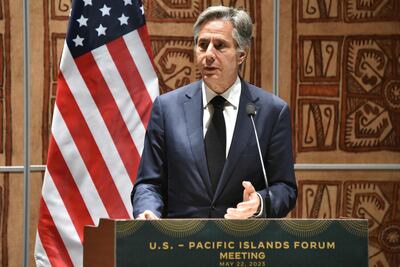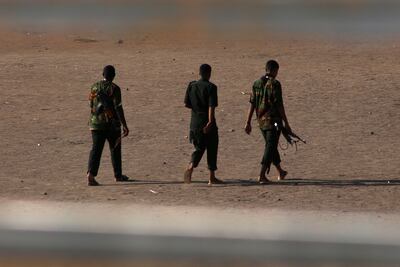The first morning of a seven-day ceasefire in Sudan got off to a shaky start on Tuesday as artillery boomed and jets circled Khartoum.
The internationally brokered truce followed five weeks of battles between the military and its rival, the paramilitary Rapid Support Forces.
It is the latest attempt by foreign powers to bring the fighting to an end. None of the previous ceasefires halted the violence and it is unclear still if the latest attempt will be a success.
Residents said the two sides were fighting right up to the start of the truce at 9.45pm local time on Monday but that, despite explosions on Tuesday, the situation appeared calmer than in recent days.
The US and Saudi Arabia brokered the ceasefire to allow much-needed humanitarian supplies to reach the most needy as activists wrote to the UN complaining of dire human rights abuses by fighters.
On Tuesday, US Secretary of State Antony Blinken warned Sudan's rival generals ― army chief Gen Abdel Fattah Al Burhan and Rapid Support Forces commander Gen Mohamed Dagalo ― to abide by the latest ceasefire or face sanctions.
In a video message posted on social media by the US embassy in Khartoum, Mr Blinken said the fighting had been “tragic, senseless and devastating”.
The truce, he said, was meant to allow the delivery of humanitarian assistance and restore essential services and infrastructure destroyed in the clashes.
Also on Tuesday, Mr Blinken said the US is providing $245 million in humanitarian aid to Sudan and neighbouring countries to help them cope with an ongoing crisis stemming from the Sudanese conflict.

A remote mechanism, backed by the US, has been established to monitor the truce, Mr Blinken added. It is a 12-member monitoring committee consisting of three representatives from the warring sides, three from the US and three from Saudi Arabia.
“If the ceasefire is violated, we’ll know and we will hold violators accountable through sanctions and other means,” he said.
“We facilitated the ceasefire, but it’s the responsibility of the Sudanese Armed Forces and Rapid Support Forces to implement it.”
Khartoum residents said there were heavy exchanges of fire as well as artillery shelling in the hours before the ceasefire was supposed to start on Monday night. On Tuesday morning, they reported fighter jets flying over the city as well as continued fighting in some areas.
Heavy bombardments could be heard in east Khartoum, they said. Armoured vehicles were patrolling the streets. Other residents reported relative calm early on Tuesday, the first full day of the ceasefire.
After five weeks of fierce battles between the army and the RSF, the warring factions on Saturday agreed to a seven-day truce and allow the delivery of aid.

The ceasefire deal, reached in talks in Jeddah, has raised hopes of a pause in a war that has killed at least 1,000 people and injured thousands.
It has already driven nearly 1.1 million people from their homes, including more than 250,000 who have fled to neighbouring countries, threatening to destabilise an already volatile region. Those who fled Sudan mostly sought refuge in Egypt, Chad, South Sudan and Ethiopia.
“There isn't really a truce or hope for a real one. Every day is another disaster for us,” said Mohammed Babekr, a father of three who lives in Khartoum's Kalakla district.
“No one can tell when this war will end, but I and my family have finally decided to leave Khartoum and go to Shindi in the north,” said Mr Babekr, who works for the state electricity company.
“Our patience is running out. We wake up every day to the sound of warplanes and artillery shelling,” said Mudather Ibrahim, a government employee from Omdurman's Al Manarah district. “Thank God, I still have a little money, but I don't know what I will do for food if this war continues.
“May God grant us patience and end this absurd war.”
Shortly before the ceasefire was due to take effect on Monday night, the RSF released an audio message from Gen Dagalo, better known by his nickname Hemedti, in which he thanked Saudi Arabia and the US but urged his men on to victory.
“We will not retreat until we end this coup,” he said, enforcing the widely held view that he and Gen Al Burhan, the army chief, are determined to fight on.
In a Monday night briefing to the UN Security Council in New York, the UN envoy to Sudan, Volker Perthes, warned of the increasing “ethnicisation” of the conflict.
He said it risked “engulfing the country in a prolonged conflict, with implications for the region”.
“In West Darfur, clashes between the Sudanese Armed Forces and the Rapid Support Forces spiralled into ethnic violence on April 24,” Mr Perthes said. “Tribal militias joined the fight and civilians took up arms to defend themselves.”
The number of such incidents has grown in recent weeks, he added.

“In parts of the country, fighting between the two armies or the two armed formations has sharpened into communal tensions, or triggered conflict between communities,” Mr Perthes said. “Warning signs of tribal mobilisation are also reported in other parts of the country, particularly in South Kordofan.”
Sudan, Africa's third largest country, with a population of 44 million, is ethnically and religiously diverse. That diversity has consistently been at the heart of the nation's multitude of civil wars that date back to the 1950s and which killed and displaced millions.
The RSF and Gen Dagalo, for example, have their roots in the western region of Darfur, while the army's top brass, including Gen Al Burhan, traditionally come from the prosperous north of Sudan.
Darfur was torn by civil war in the 2000s, when the RSF's forerunner, the Janjaweed militia, fought on the government's side against ethnic African rebels.
The Janjaweed, mostly drawn from local Arab tribes, also regard themselves as victims of the perceived discrimination by Khartoum's political and military elite.

